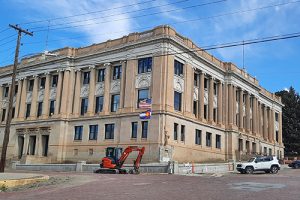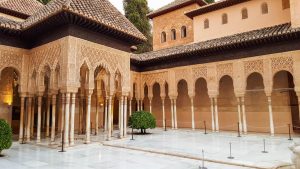SUGARITE — While fighting with the Austrian Army in World War I, Anton Cunja, father of Mary King of Raton, was captured by the Russians and spent four years in Siberia as a prisoner of war. Upon his release, he and his family barely existed as peasant farmers. He longed for freedom from tyranny and a better life for his family. During the early part of the twentieth century, the United States was accepting immigrants so King’s Slovenian parents, Anton and Antonia Cunja, decided to leave their home in the tiny Austrian village of Ospo, and travel across the Atlantic Ocean to America. They arrived in New York in June, 1921, under the sponsorship of an American cousin, Tony Novak. King says, “My dad was thirty-six and my mother was thirty-two. They had a daughter Marcella, eight, and a son Mario, two, and they were expecting a child. They got on the last journey of a ship called Columbia. It took a whole month to get to America. They wanted to hold my mother back because she was pregnant, but instead, on the ship’s log they listed the baby as a ‘stomach tumor’. Two months after their arrival, King’s sister Velma was born. Initially, the Cunja
family settled in the coal mining camp of Yankee in northeastern New Mexico. King and her sister Elizabeth were born while the family lived in Yankee. In 1926, the Cunjas moved to the nearby coal camp of Sugarite, and two years later their last daughter, Emma, was born. The once thriving coal camp of Sugarite is currently a featured historic spot in Sugarite State Park, eight miles northeast of Raton. Prior to the start of coal mining development, Sugarite Canyon was active with cattle ranches. Limited coal mining operations began in 1910 under the management of the St. Louis, Rocky Mountain and Pacific Company. With the beginning of full-scale operations in 1912, Sugarite Coal Camp, in its beautiful setting along Chicorica Creek, became well known for its production of high quality domestic coal. Sandstone and coke block houses were built on slopes and terraces along the canyon sides. King recalls, “We lived in a four room house and it had a long porch on the front and a smaller porch in the back. There was a kitchen, a dining room and one bedroom that my folks slept in and the six children slept in the other bedroom. It was like sleeping in a deep freeze in the winter. When my dad got up in the morning, he lit that round bellied stove, called a monkey stove, and he turned the phonograph on to wake us up. So we’d all crawl out and get around that stove and warm up.” Cooking was done on a Majestic coal stove that had a water tank on the side. King says, “The water faucet was outside, but my dad piped the water into our house, and we heated it in a side tank attached to the stove. That’s how we heated our water for cooking, washing clothes and bathing. We had outside toilets, and for toilet tissue we used pages from Montgomery Wards and Sears catalogs. That was kind of stiff paper so you had to kind of crumple it but we thought nothing of it because everybody was in the same boat. Our weekly bath on Saturday was in a big round No. 3 wash tub.” King’s family raised chickens and rabbits for food, had a vegetable garden and a few fruit trees. She says, “We bought un-pasteurized milk from local farmers who peddled it around camp, and occasionally we bought a slaughtered hog and processed it ourselves. For his lunch in the mine, my dad took a few slices of cured bacon, sprinkled with a little salt.” Her mother baked bread frequently, made homemade noodles, and “she could make delicious sauces out of practically nothing.” On special occasions the family enjoyed strudel or potica. The Sugarite School housed grades one through eight, with Loren Malcolm as principal. Once students finished the eighth grade, they were bused to Raton to attend high school. King remembers, “My favorite teacher was Lottie Washburn. I don’t remember too much about the other teachers, but they were all good teachers, and they taught everything. We had penmanship contests and spelling bees. All of my life people have told me that I have a beautiful penmanship, because they drilled that cursive writing into us. Once a week special teachers came to the camp. Edith Botsford came out once a week to teach the girls sewing and embroidery. Jessie French taught music. The boys were taught manual training. In his wood working class my brother made my youngest sister a little wooden duck that she pulled along with a string.” Some of the fun at the camp included Sunday baseball games with competing coal camps, picnics in Sugarite Canyon, and ice skating at Lake Maloya. “We never said the words ‘I’m bored’”, King states. Other games that everybody played were basketball, Hide and Seek, Run Sheep Run, Kick the Can, Mumblety-Peg, and marbles. The club house was also a hub of activity. King recalls, “Every Sunday we got a nickel from our folks. We’d go up to the club house and we had to decide whether to buy an ice cream cone or five ‘penny candies’.” She goes on to say, “We had a lot of fun at the dances at the Club House. Instead of hiring a baby sitter, all the kids were there. People brought their babies in big baskets and laid them on one or two chairs. The babies slept all night to the music of the band.” During his years of working in the mine, King’s father sustained several injuries, including a broken leg, broken collarbone, and a varicose leg ulcer that never healed. He came extremely close to being paralyzed when a cave-in covered him up to his neck in coal. As a result of the accident, he spent nine months in the company hospital in Gardiner with a broken back. King recalls, “It was then that the SNPJ Lodge paid him small benefits, which helped our family survive. The SNPJ Lodge also carried our dues until we could start paying. Thank God he had all the family enrolled in SNPJ before the accident. After his recovery, he was allowed to only work a half-day instead of a full day. At that time the mine was slow and crews only worked one or two days a week. So his check for one week was $2.50.” The Sugarite Coal Camp closed in 1941, due to labor issues and the decreased need for domestic coal. By 1942 the company removed or sold most of the residences and the majority of the populace moved to Raton. King’s family lived in Sugarite until the camp closed, which coincidentally was the same year that she graduated from high school. When the camp was closing, King’s parents were one of the first families to be asked to leave, due to their opposing political views with company officials. King says, “My parents, I don’t think, had bad feelings about anyone but they didn’t like some of the things the company did. My parents were Democrats and it was the time of (Franklin) Roosevelt. They liked Roosevelt and they had a big picture of him hanging on the wall. Company officials visited and requested that my dad take the picture down, but he refused. Around election time company officials came around with a sample ballot to tell my parents how to vote – for the Republican candidate. My mother pretended she didn’t know better and started to mark the ballot as they requested, and they said, ‘No, wait until you go down to vote.’ When they left, my parents laughed to themselves. At election time they went to the polls and voted for Roosevelt. My parents didn’t like to be told what to do, and that was from their experiences in the old country. My dad wanted his freedom.” According to King, the elder Cunjas were “thrilled to become American citizens, but they never forgot their Slovenian heritage”. She says, “They taught us native songs, told us stories about the ‘old country’, and my dad gave us recipes he carried around in his head.” King is proud of the role her coal miner father played in American history. She reflects, “When I think of all my parents suffered in their lifetime, I believe they were ‘Profiles in Courage’, as were so many miners. They came from many foreign countries with every ethnicity, and worked underground in unsafe conditions with not enough pay and not enough concern for their physical welfare. Many lost their lives in mine explosions, serious accidents, and to black lung disease. In my opinion all miners’ courage, dedication, and sacrifice helped the United States prosper. May God bless them!”




